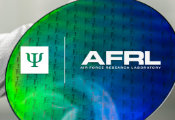Manfra Appointed to Lead Purdue’s Quantum Institute
Manfra Appointed to Lead Purdue’s Quantum Institute
Quantum computing expert Michael Manfra has been named director of the Purdue Quantum Science and Engineering Institute (PQSEI), effective March 1. He is the Bill and Dee O’Brien Distinguished Professor of Physics and Astronomy, professor of electrical and computer engineering, and professor of materials engineering.
Purdue Chemists Control Artificial Atoms in Quantum Materials With a ‘Twist’
Purdue Chemists Control Artificial Atoms in Quantum Materials With a ‘Twist’
An international team of scientists is manipulating moiré superlattices of two-dimensional materials to design and analyze novel quantum materials properties.
Microcomb Chips Help Pave the Way for Thousand Times More Accurate GPS Systems
Microcomb Chips Help Pave the Way for Thousand Times More Accurate GPS Systems
The microcomb chips developed by the research team at Purdue University and Chalmers University of Technology can help shrink down optical atomic clock systems considerably and make them more accessible in society. As a result, optical atomic clocks may be used in satellites and remote research stations, enabling a thousand times more precise GPS systems, with great benefits for autonomous vehicles and all electric systems based on positioning.
Materials Developed at Purdue University Incorporated Into New Microsoft Quantum Qubit Platform
Materials Developed at Purdue University Incorporated Into New Microsoft Quantum Qubit Platform
Microsoft Quantum published an article in Nature on Feb. 19 detailing recent advances in the measurement of quantum devices that will be needed to realize a topological quantum computer. Among the authors are Microsoft scientists and engineers who conduct research at Microsoft Quantum Lab West Lafayette, located at Purdue University. In an announcement by Microsoft Quantum, the team describes the operation of a device that is a necessary building block for a topological quantum computer. The published results are an important milestone along the path to construction of quantum computers that are potentially more robust and powerful than existing technologies.
ORNL Entanglement Study Connects Quantum Essentials on New Chip
ORNL Entanglement Study Connects Quantum Essentials on New Chip
Quantum information scientists at the Department of Energy’s Oak Ridge National Laboratory successfully demonstrated a device that combines key quantum photonic capabilities on a single chip for the first time.
Pioneering Quantum Spin Liquids Earns Purdue Scientists and Engineers a Prestigious W. M. Keck Foundation Grant
Pioneering Quantum Spin Liquids Earns Purdue Scientists and Engineers a Prestigious W. M. Keck Foundation Grant
Quantum spin liquids are unusual states of matter where the spins stay actively in motion even at extremely low temperatures. These spins show a fascinating behavior called fractionalization, where particles seem to break into smaller parts. Purdue University researchers seek spin excitation modes, which are key in finding fractionalization using optical tools.
Global Data Storage Company Seagate Partners With Chicago Quantum Exchange
Global Data Storage Company Seagate Partners With Chicago Quantum Exchange
Seagate, a global data storage and memory technology company, has joined the Chicago Quantum Exchange as a corporate partner.
Quantum Research Sciences Wins DLA Contract to Develop Product Obsolescence Prediction Tool
Quantum Research Sciences Wins DLA Contract to Develop Product Obsolescence Prediction Tool
Purdue University-connected software company Quantum Research Sciences (QRS) has received a Phase I Small Business Innovation Research contract from the Defense Logistics Agency (DLA), which contracts, purchases, distributes, stores and disposes of items for the Department of Defense.
Qolab, the First UW–Madison-Incubated Quantum Startup, Joins the CQE
Qolab, the First UW–Madison-Incubated Quantum Startup, Joins the CQE
Qolab, the first quantum computing startup incubated at the University of Wisconsin–Madison, has joined the CQE as a corporate partner — a move that its leaders say underscores the company’s foundational commitment to collaboration.
Simulating the Quantum World: Purdue Researchers Get Cold With ‘Quantum Coarsening’
Simulating the Quantum World: Purdue Researchers Get Cold With ‘Quantum Coarsening’
Using supercold environments and a quantum computer, Purdue researchers examined the evolution of a network of Ising spins in the presence of a transverse field. Much like ripples on water, the wave moves across the surface, but the water molecules move up and down, perpendicular to the wave's direction. This type of computational discovery is challenging with conventional or even supercomputers. This discovery, led by Arnab Banerjee, an assistant professor at Purdue University's Department of Physics and Astronomy, has been published in Nature Communications.


























